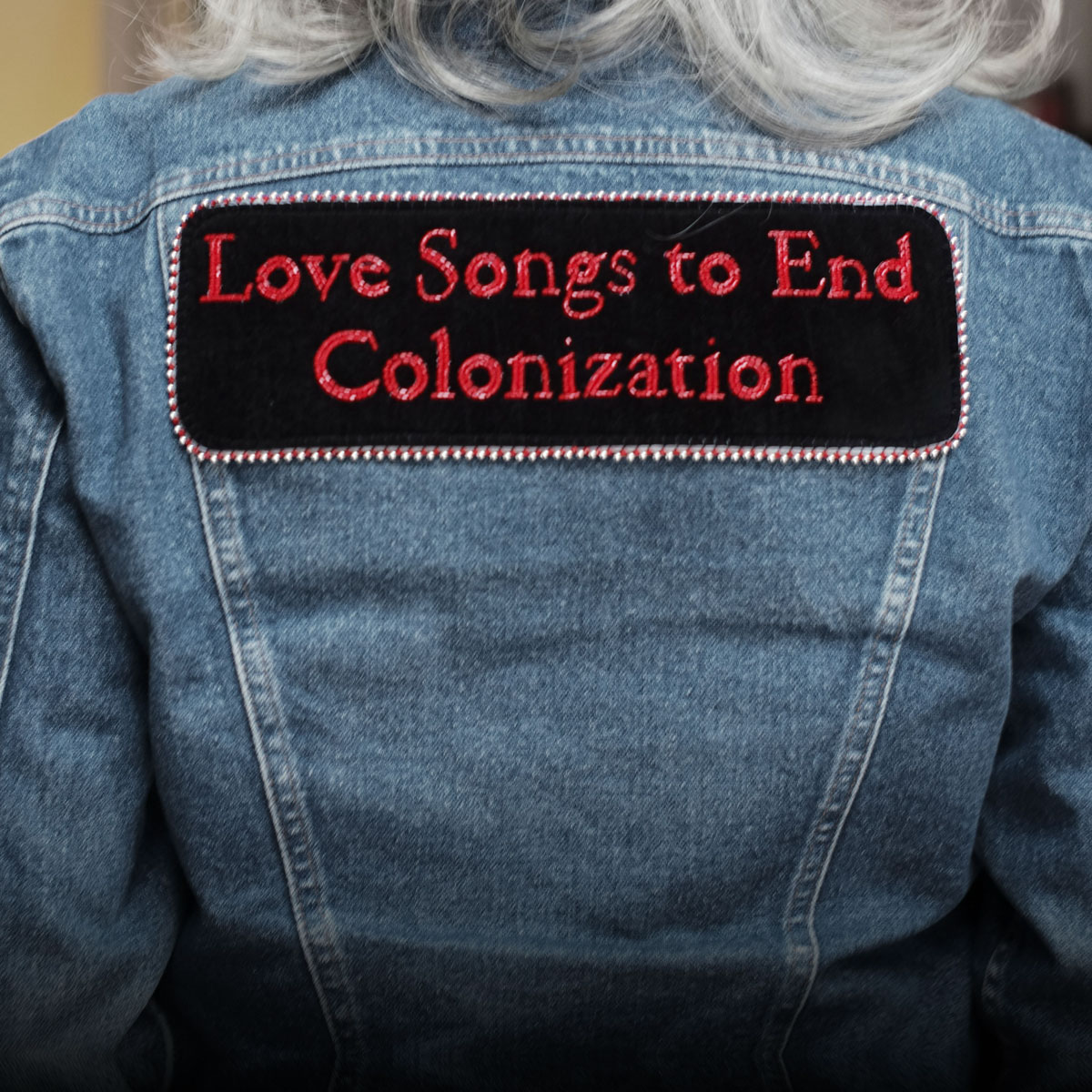
Love Songs to End Colonization Album Cover. Image credit: Ashok Mathur
C.9 Love Songs to End Colonization: Karaoke as a subversive methodology for making change
Fri Oct 20 / 13:30 – 15:00 / KC 101 103
chairs /
- Peter Morin, Ontario College of Art and Design University
- Tomas Jonsson, Dunlop Art Gallery
- Jimmie Kilpatrick, Brandon University
This panel examines the structure of karaoke as a decolonial method that recentres power within the body for systematic change. This is in one part an invitation to folks at this panel session to pick songs, and sing, to end colonization in Canada. This application of Karaoke as a method for picking songs puts singers into a new kind of relation with each other and the land. During the song offering Kilpatrick and Morin will present work on the importances of repurposing of popular love songs as an embodied and collective critique and confrontation settler colonialism. Love Songs to End Colonization is also a double-vinyl album and performance art object that invites singers, listeners, bodies to understand how physical spaces are complicated by colonization. In this session, Morin and Kilpatrick will open up a space for singers, and listeners, to know that we are the love songs transformed by cross-ancestral collaboration and liberation. Karaoke being prioritized as a creative methodology that centres joy and kindness. Following along the work of scholars like Dylan Robinson, and Susan Blight, Kilpatrick and Morin, through this session, are inviting participants to sing a future, a future where everyone is invited to add their intention/spirit to the creation of a world that isn’t built on harming Indigenous bodies/territories/knowledges.
keywords: decolonization, performance, indigeniety, settler-colonialism
session type: panel
Peter Morin is a grandson of Tahltan ancestor artists. Morin’s work highlights cross-ancestral collaboration and deeply considers the impact zones that occur between Indigenous ways of knowing and Western Settler Colonialism. Morin’s practice has spanned twenty years so far, with exhibitions in London, Berlin, Singapore, New Zealand, and Greenland, as well as across Canada and the United States. Morin currently holds a tenured appointment in the Faculty of Arts at the Ontario College of Art and Design University in Toronto.
Jimmie Kilpatrick is a musician, educator, and interdisciplinary artist who works as a Sessional Instructor at Brandon University, in Brandon Manitoba. Jimmie has been releasing Albums on Canadian imprint You’ve Changed Records since 2009.
Tomas Jonsson is a curator, writer and visual artist whose diverse practice focuses on the socially engaged, collaborative nature of the artmaking process. He currently resides in Treaty 4 Territory (Regina), where he is Curator of Moving Image and Performance at the Dunlop Art Gallery.
Come and Get your Love – The Art of Karaoke
- Kevin deForest, Brandon University
As a ubiquitous leisure activity in North America, karaoke has the potential to serve as a medium of cultural critique and social awareness. A brief historical context for this Japanese entertainment import will also include discussion of artwork that intersects with popular music from the Love Songs to End Colonization project from Peter Morin and Jimmie Kilpatrick, as well as artwork from the author will be reflected on and acknowledge karaoke as a means to explore cultural identities and build resilient community.
Kevin Ei-ichi DeForest is a visual and multimedia artist. He was born in Winnipeg, Manitoba to Japanese and Swiss parents. He studied architecture (Bachelor of Environmental Studies, 1983) and fine art (BFA, 1986) at the University of Manitoba before getting an MFA from Concordia University in 1994.
Love Songs (to end hetero-patriarchal, settler-colonial, extractivism)
- Natalie Loveless, University of Alberta
This talk reflects on my first encounter with Peter & Jimmie’s Love Songs to End Colonization (Dunlop Art Gallery in Regina, October of 2022). Drawing on Vanessa Machado de Olivera’s conception of hospicing modernity, I interweave embodied memory, personal reflection, and a consideration of “love as method” — ambivalent, compromising, and unsettling.
Dr. Natalie Loveless is Professor, Contemporary Art & Theory, in the University of Alberta’s Department of Art and Design. She is the director of the U of A Research-Creation and Social Justice CoLABoratory, and co-leads SPAR²C the Faculty of Arts’ Signature Area in Research-Creation.
I Am Singing With You Because I Need You: Shared Utterances and Travelling Songs
- Susan Blight, OCADU
There is a song in our family, and perhaps other Anishinaabe families, that goes, "onzaam waasaa gidonji gichii wiichii namba" which translates in English to "you are too far away for me to be with you". In this talk, I analyze seemingly disparate practices of Ojibwe polyphonic sound from karaoke to travelling songs as gestures towards freedom, joy and the healing of grief.
Susan Blight (Anishinaabe, Couchiching First Nation) is an interdisciplinary artist working with public art, site-specific intervention, photography, film and social practice. Her solo and collaborative work engages questions of personal and cultural identity and its relationship to space. Susan is Chair in Indigenous Visual Culture at OCAD University and an Assistant Professor in the Faculty of Arts & Science and most recently, joined The Capilano Review as Associate Editor of the publication's "Indigenous Places and Names" series.
